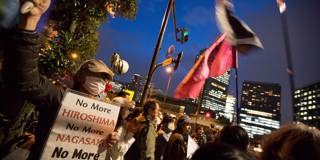On March 27, the United Nations will start negotiations on an international treaty to ban nuclear weapons. The nuclear weapon states will finally be put to the test: Will they keep their promises to disarm and join the treaty, or will they reject international law and the will of the global community?
PRINCETON – On March 27, the United Nations will start negotiations on an international treaty to ban nuclear weapons. It will be a milestone marking the beginning of the end of an age of existential peril for humanity.
This day was bound to come. From the beginning, even those who set the world on the path to nuclear weapons understood the mortal danger and moral challenge confronting humanity. In April 1945, US Secretary of War Henry Stimson explained to President Harry Truman that the atomic bomb would be “the most terrible weapon ever known in human history.” Stimson warned that “the world in its present state of moral advancement compared with its technical development would be eventually at the mercy of such a weapon. In other words, modern civilization might be completely destroyed.”
Soon afterwards, the newly created UN, established with the express purpose “to save succeeding generations from the scourge of war,” took the threat posed by nuclear arms as its first priority. In January 1946, in its very first resolution, the UN called for a plan “for the elimination from national armaments of atomic weapons.”

PRINCETON – On March 27, the United Nations will start negotiations on an international treaty to ban nuclear weapons. It will be a milestone marking the beginning of the end of an age of existential peril for humanity.
This day was bound to come. From the beginning, even those who set the world on the path to nuclear weapons understood the mortal danger and moral challenge confronting humanity. In April 1945, US Secretary of War Henry Stimson explained to President Harry Truman that the atomic bomb would be “the most terrible weapon ever known in human history.” Stimson warned that “the world in its present state of moral advancement compared with its technical development would be eventually at the mercy of such a weapon. In other words, modern civilization might be completely destroyed.”
Soon afterwards, the newly created UN, established with the express purpose “to save succeeding generations from the scourge of war,” took the threat posed by nuclear arms as its first priority. In January 1946, in its very first resolution, the UN called for a plan “for the elimination from national armaments of atomic weapons.”